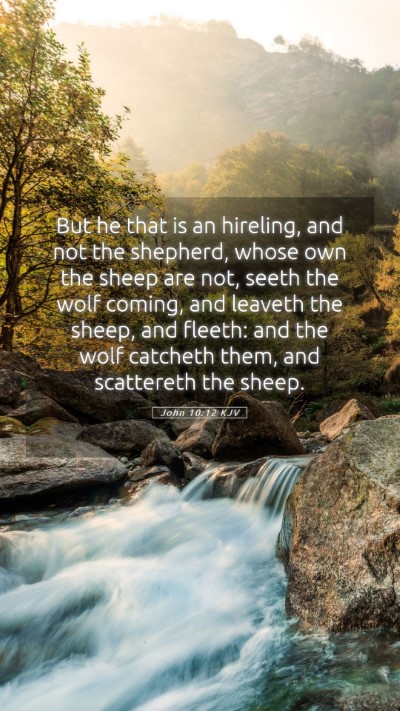Understanding John 10:12: A Comprehensive Bible Verse Commentary
In John 10:12, we encounter a profound revelation about the nature of leadership, protection, and the essence of true care within the Christian faith. This scripture states:
"But he that is an hireling, and not the shepherd, whose own the sheep are not, seeth the wolf coming, and leaveth the sheep, and fleeth: and the wolf catcheth them, and scattereth the sheep."
To fully grasp its meaning, let’s delve into insights from renowned public domain commentaries.
Contextual Background
In the Gospel of John, Jesus uses the shepherd and sheep analogy to explain His relationship with His followers. This context emphasizes His role as the Good Shepherd, contrasting it with those who do not truly care for the flock. We should examine this verse by understanding the roles of hirelings versus the true shepherd.
Exegesis and Interpretations
-
Matthew Henry Commentary:
Henry asserts that the "hireling" represents those who are mercenaries in faith—individuals drawn to leadership for monetary gain or personal advantage rather than a genuine concern for their congregants. When danger arises, such as the arrival of a wolf, the hireling abandons the flock because they aren't intrinsically invested in their well-being. Henry emphasizes the foolishness of such a leader and warns against those who watch over the church as a job rather than a calling. This verse illustrates the critical distinction between genuine and insincere leadership.
-
Albert Barnes’ Notes:
Barnes expands upon the metaphor, explaining that the "wolf" symbolizes dangers—spiritual, physical, and moral—that threaten the community of believers. The hireling's departure in the face of danger highlights a fundamental lack of responsibility and commitment to the sheep. Barnes notes that true shepherds (like Jesus) are willing to confront dangers for their flock, emphasizing sacrifice and protection over self-preservation.
-
Adam Clarke’s Commentary:
Clarke focuses on the implications of the hireling's actions, using this metaphor to portray unfaithful leaders in spiritual contexts. His interpretation delves deep into moral responsibilities expected of leaders within the faith community. Clarke points out that true shepherds are identifiable by their love and dedication to their sheep, contrasting sharply with those who abandon their charges when adversity strikes. This reflects a broader teaching on accountability among leaders within the church.
Theological Implications
The verse carries profound theological implications concerning responsibility in leadership and the nature of Christ’s sacrificial love for humanity. The juxtaposition of the hireling and the good shepherd invites deeper reflection on our commitments—both as leaders and followers in our faith journeys.
Practical Applications
How can we apply this verse in daily life? Understanding John 10:12 challenges individuals to evaluate their own commitments and the examples of leadership within their communities. The need for leaders who are genuinely invested in their charges is paramount. This verse serves as a reminder for believers to seek out communities led by those who reflect Jesus' dedication to their spiritual welfare.
Related Scripture References
- John 10:11: "I am the good shepherd: the good shepherd giveth his life for the sheep."
- 1 Peter 5:2-4: "Feed the flock of God which is among you, taking the oversight thereof, not by constraint, but willingly; not for filthy lucre, but of a ready mind."
- Ezekiel 34:10: "Thus saith the Lord God; Behold, I am against the shepherds; and I will require my flock at their hand..."
Conclusion
In summary, John 10:12 presents a critical examination of leadership within the Christian faith. Through the insights offered by public domain commentaries, we gain a deeper understanding of the responsibilities of those who lead and the nature of true care and sacrifice expected of them. As we reflect on this verse, it encourages us to seek growth in our understanding of spiritual leadership and to be vigilant against those who may not have our best interests at heart. By studying scripture, we equip ourselves with the knowledge necessary for personal growth and informed participation in church communities.


